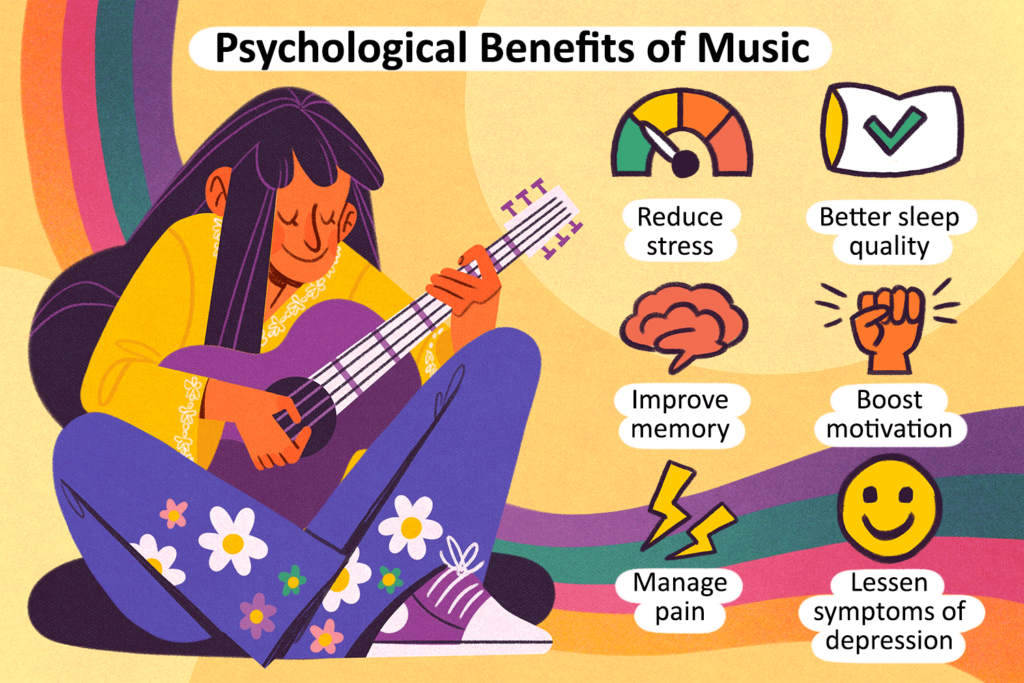|
Getting your Trinity Audio player ready...
|

- Music is one of the potent cures available to look for solutions to the mental health problems afflicting our population, especially the younger generation.
- Stress, anxiety, depression and other mental health issues are becoming dangerously common in India, specifically in the metros and large cities.
- Lack of awareness coupled with the general prejudices surrounding mental health problems are brushed under the carpet which later develops into an unmitigated disaster.
- Many scientific studies conducted all over the world including India show the positive effect of music on the mental health of humans.
India has a rich collection of stories and music that have been passed down from one generation to another. These not only include the historical grand creations of epics like Ramayana and Mahabharatha by Sages like Valminki, who is called Adikavi or Vyasa Maharshi. The collection of Indian cultural music and literature also doesn’t stop at the ingenious poets like Bhasa or Kalidasa, who enriched the nation and language with their masterly use of the language and producing some of the mindblowing depictions like meghadootha or malavikagnimitra. This doesn’t end at the doorstep of Alwars or Dasa Parampara who sang praises of their ista daiva(chosen form of god) in their local tongue for the benefit of thousands of masses, not restricted to the handful of well-read pandits.
Indian literature also houses a huge collection of works of the highest quality folk songs. Many of these were developed over time through successive generations, still, many were created by nameless poets who were contented remaining unknown for their works from the rest of the world. This is true in all the regions, cultures and languages in India. Work collecting and compiling isn’t done on a scale that it deserves. Sadly much of these works are slowly eroded by the sands of time. The reason for looking into all these works is important and has a huge untapped potential in India ready to be explored.
Burgeoning Mental Health Issues
With the fast-paced life of IT workers, uncertain futures, high-pressure performance standards and dissolving structured life routines, the people in metros of India are more prone and vulnerable to mental exhaustion resulting in mental health issues. Stress, anxiety, depression and other mental health issues are becoming dangerously common in India, specifically in the metros and large cities. Lack of awareness coupled with the general prejudices surrounding mental health problems that need professional attention are brushed under the carpet which later develops into an unmitigated disaster. Our borrowed way of life, which is not from the West alone, is not the natural order of things resulting in being a significant contributor.
The apartment culture is slowly becoming rampant, where people have isolated themselves in a cage which they call a flat, in the name of personal space and privacy. Man is a social animal, he thrives in the social games that are played in the community. Gathering, gossiping, and performing rituals are all tools devised by the homo sapiens to live in harmony in a tribe. Ritual in this context is not only limited to religious ones but also many social actions we perform when in public space, including simple things like saying thank you. It is not a coincidence that many consider solitary confinement one of the cruellest forms of punishment in prisons and ask for its removal.
Be that as it may, it can be concluded with relative accuracy that mental health issues are slowly creeping as an undercurrent in urban cities unseen but the effect of which is felt by many. Loneliness, depression or substance abuse whatever the name, most of which are the result of an unnatural way of life.
Music to the Rescue
Music is integral to the culture of India. No ritual, traditional or cultural, is complete without some kind of music being a part of it. From the traditional ceremonies for the baby in the womb of the mother to the Ganesha festivals and even the last rites and journey of the dead, music is present in all the stages and celebrations of life. Still, it can be said that the full potential of music is left untapped.
There are many scientific studies which are conducted all over the world including India that show the positive effect of music on the mental health of humans. Be it the lullabies sung to children by mothers and grandparents, to soothe them or the songs of saints sung with the deepest of devotions, everyone has experienced the effects of music personally even if not quantified. Folk songs that are sung during the back-breaking work in the villages, whose rhythm and tone perfectly synchronised with their work to reduce the burden on body and mind is indeed something that requires more studies in India.
Many institutions and companies may look into the option of holding communal music sessions as a low-cost and high-return method of reducing the mental health problems of their employees. The societies created in apartments might also look to conduct these sessions in some common areas for the residents which will not only improve the mental health but also improve bonding and camaraderie among the residents. This will also have an effect in reducing the substance abuse problem which is rampant in youth.

Experimenting with Music
Maternal mental health is something that has even less awareness in India than mental health. The effects of which have long-term implications for the mother and child. Community music might also be used in Anganwadis or Primary health care centres to be participated by pregnant women and new mothers, who are particularly vulnerable during those times. This intervention may seem too simple to be taken seriously, but the psychological impact can be proved through scientific studies. A recent experiment in Gambia, in which perinatal women were involved in musical intervention on a weekly basis showed insignificant improvement in their mental health status. This study was repeated in South Africa with similar results. As this is low cost, the economic or digital divide of the masses will not be a decisive factor.
A study was conducted in Germany1 named “The effects of music and singing intervention during pregnancy on maternal well‑being and mother-infant bonding: a randomised, controlled study” in 2020. 743 pregnant women at the Clinic for Gynaecology and Obstetrics at the University Hospital Duesseldorf were screened for this study. Participants in the music group joined one music session with up to three other women between the first time of measurement and the 34th gestational week. The study revealed positive immediate effects of active singing and passive music listening on salivary cortisol and oxytocin as well as on valence, arousal and dominance.
Another study in the UK2, with a sample of 222 participants revealed that over a 12-week period, participation of prenatal pregnant women in passive listening of music reported a significant decrease in symptoms of anxiety and depression compared to the control group.
Conclusion
Mental health is not a topic that is discussed in India, as much as it should. But the effects of mental health issues are today felt on such a big scale that it cannot be denied. The increasing suicides of famous celebrities, who apparently had everything one could hope for to lead a good life and the increasing suicide rate of students (as evident in the recent incidents in Kota) are just the tip of the iceberg.
Music is one of the potent weapons available for governments and civil societies to look for solutions to address these problems. But we must be able to recognise the problem, not just treat the symptoms with superficial cures. We must take the initiative to be proactive in dealing with the problem before the situation goes out of hand.
(The author has an M.Sc. in Psychology and serves in NIMHANS. He writes regularly on politics, society, international affairs and technology. Opinions expressed are the author’s own)
References:
- The influence of maternal singing on well-being, postpartum depression and bonding – a randomised, controlled trial https://bmcpregnancychildbirth.biomedcentral.com/articles/10.1186/s12884-021-03933-z
- https://www.biomedcentral.com/search?searchType=publisherSearch&sort=Relevance&query=music&page=2
Shreyas has an M.Sc. in Psychology and serves in NIMHANS. He writes regularly on politics, society, international affairs and technology. Views expressed are the author’s own and do not necessarily reflect the views of SamvadaWorld or its staff.
